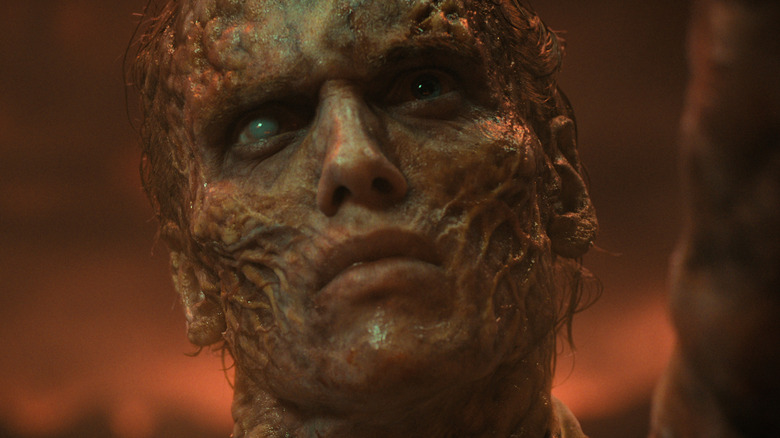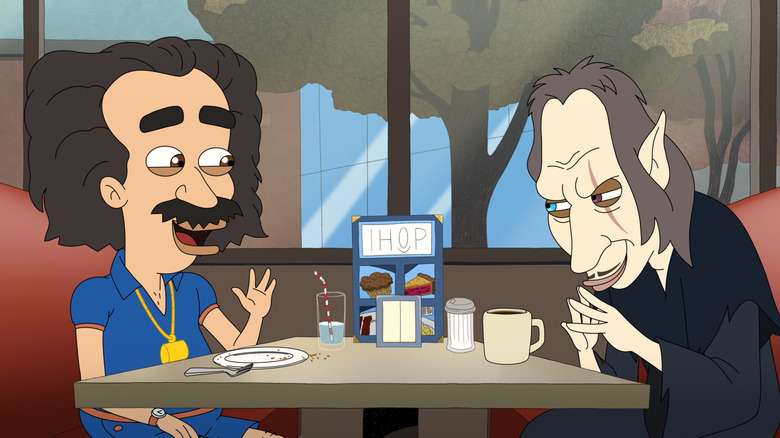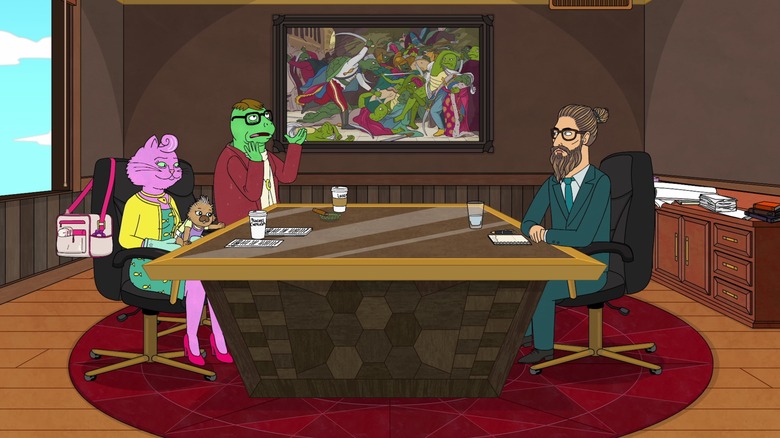If Netflix Implodes, It Will Have Only Itself To Blame
The past couple of years have not been good for Netflix. The streaming service that changed the course of entertainment over the past decade now finds itself bleeding subscribers, watching its stock crater, and visibly flailing to find new footing in the media space it helped create.
Netflix is still not without its successes, but they are fewer and farther between, and the list of failures keeps on growing. In April 2022, Big Red announced that it had, for the first time in a decade, seen a net loss of subscribers during a fiscal quarter. It continued to bleed for the next several months and didn't begin to recover until October (via CNN). At one point, as reported by The Wall Street Journal, the company lost $50 billion in a single day, a figure so large it can only be measured in the abstract. It's speculated that the rebound late last year was only due to "Stranger Things 4."
Ultimately, Netflix climbed to the top of the media business only to find itself balanced perilously on the edge of a precipice. Like the dog who catches the mail truck, Netflix has no idea what to do with its position of dominance in the industry. But how did this happen?
The truth is, Netflix is a victim of its own short-sighted practices. In pursuit of recreating the lightning in a bottle of "Stranger Things," "Squid Game," and other unprecedentedly massive hits, the streamer seems to have forgotten how TV builds an audience in the first place. It cancels shows before they can develop, drops them all at once with little to no marketing, and frustrates subscribers by treating them as the enemy. If Netflix has a Humpty Dumpty-style fall, it will have only itself to blame.
Gardens don't grow in a day
These days, it seems Netflix operates out of a binary worldview in which there is either world-dominating success or abject failure. It's true, the streamer has seen many of the former. "Stranger Things," "Squid Game," and several other Netflix Originals have run roughshod over streaming records, collecting billions of hours streamed. But for each of those razed-earth successes, there are countless series whose performance is merely adequate, and it is these shows that Netflix ignores to its own detriment. Like the parent who grounds their child for anything less than an A+ on the report card, Netflix continues to cancel almost every series that cannot prove itself an immediate hit.
As argued by a recent opinion piece in Forbes, this creates a self-fulfilling feedback loop. Netflix bases its decision to renew a series on the performance of the first season. And after so many canceled shows, viewers begin to ask why they should start watching the first season of something when the odds of getting a second are slim to none. Netflix then interprets this low viewership data as proof of failure, and the cycle repeats. The rolling stone gathers moss. The snowball, well ... snowballs.
Do you know what we are getting, though? "That '90s Show," a live-action "Avatar: The Last Airbender" series, and a whole lot more live-action anime and manga adaptations. Netflix seems to have decided that original ideas are too risky and will now endlessly regurgitate things you've already heard of in the hopes that some graphs on their computers go up. Don't worry, though. They'll probably cancel most of those, too. All hail the algorithm.
A la carte seasons drive engagement down
If Netflix insists on canceling anything that doesn't break records, it could at least support its own programming. But take a gander at the 20 shows Big Red axed last year (via Variety) and tell us which ones you've actually heard of. If few ring a bell, it's because Netflix doesn't spend on advertising. In fact, CEO Ted Sarandos has bragged about the lack of promotion, telling TV Insider in 2015, "A lot of the heavy lifting of getting audiences to the show is done with the user interface. We can launch a lot of these shows without spending any marketing."
Sounds cool, Ted! There's just one little problem there. People need to actually open the app, and a lot of them aren't going to do that if they don't already know there's a show they might be interested in.
But let's say people open the app, see the latest show, and click play. As it stands, Netflix drops every episode of a season at once, meaning the window for that word-of-mouth buzz is a very short one. Binge-watching felt novel and futuristic back when Netflix only had a handful of originals, but these days it feels more like walking into a buffet restaurant where everything smells like ham and someone's kids keep putting their sticky hands in the mac and cheese. You eat until you're sick, then forget all about it.
Other streaming services have figured this out. The weekly model reduces pressure on audiences to inhale a series immediately and keeps them engaged. What will Homelander do next week? Is Jennifer Coolidge going to get murdered by a gaggle of gay men? Fans have seven days to discuss and speculate, to tell their friends, "You have to watch this."
Netflix keeps altering the deal (pray they don't alter it further)
There's one more reason Netflix needs to switch over to weekly releases: they're bleeding subscribers. A 10-episode season means holding onto a show's viewership for 10 straight weeks, but the all-at-once model incentivizes people to pay for a month, binge, and then cancel again. And lately, they've had plenty of reasons to cancel.
Netflix dragged people away from the cable box with the promise of ad-free television, but those days are through. If you don't want to be bombarded with ads for erectile dysfunction pills, that's going to cost extra. Want to watch in 4K? Then make more money, you broke loser, because that'll be nearly $20 a month. And if you're a college kid using your parent's account, it's time to pull yourself up by your own bootstraps, kiddo. Password sharing is about to be a thing of the past (via The Verge). You've got to pay the troll toll to get in.
All that hassle, and for what? Ethically dubious true crime series? One more season of "Stranger Things"? Season 293 of "Big Mouth"? The first season of something that's going to get canceled a week after release? Netflix needs to figure out what, precisely, the value proposition is for its service when people are spending money that could be used to buy groceries and other essentials. Even eggs are expensive now, and the first things people are likely to cut from their budgets are relative luxuries such as streaming services.
Sure enough, the public perception of Netflix has cratered. According to a Variety survey from 2022, the company is ranked last among major streamers in terms of perceived value, with HBO Max taking first place. (Given the chaos at Warner Bros. Discovery, the future may be equally grim for HBO Max, but that's another story.)
Stock prices can recover, but public perception is tougher to regain
Throughout its recent struggles, Netflix has repeatedly shown that it's more committed to pleasing Wall Street in the short term than it is to building the consumer loyalty that will keep it afloat in the long term. In 2022, the streamer fired over 450 employees, Variety reported. It also heavily reduced the size of its animation department, putting more employees out of work and leading to the cancellation of fan-favorite animated shows (via The Wrap). That's not even counting the people who are put out of work when a show is prematurely canceled. The top brass seems to be doing fine, though. Netflix is currently looking to pay someone $385,000 to be a flight attendant on the company's private jet (via Fortune).
It's incredible to consider how far from grace Netflix has fallen. No single company can reasonably be held more responsible for the death of traditional cable and broadcast television. At the outset of the streaming age, that seemed like a massive boon for consumers, ushering in a new golden age of TV. Creativity seemed to be evolving in real-time before our eyes, with new shows pushing the boundaries of what the small screen could offer. Netflix put its original offerings on the map with "House of Cards," proved that animation could be a medium for serious drama with "BoJack Horseman," and even revived cult classics like "Arrested Development." Many of its offerings have been among the best TV shows of all time. But no golden age lasts forever.
These days, the streaming market is crowded, Hollywood can't figure out how to adapt, and amid it all, Netflix seems resolved to squander its position of dominance. In the end, the last thing Netflix cancels may well be itself.




